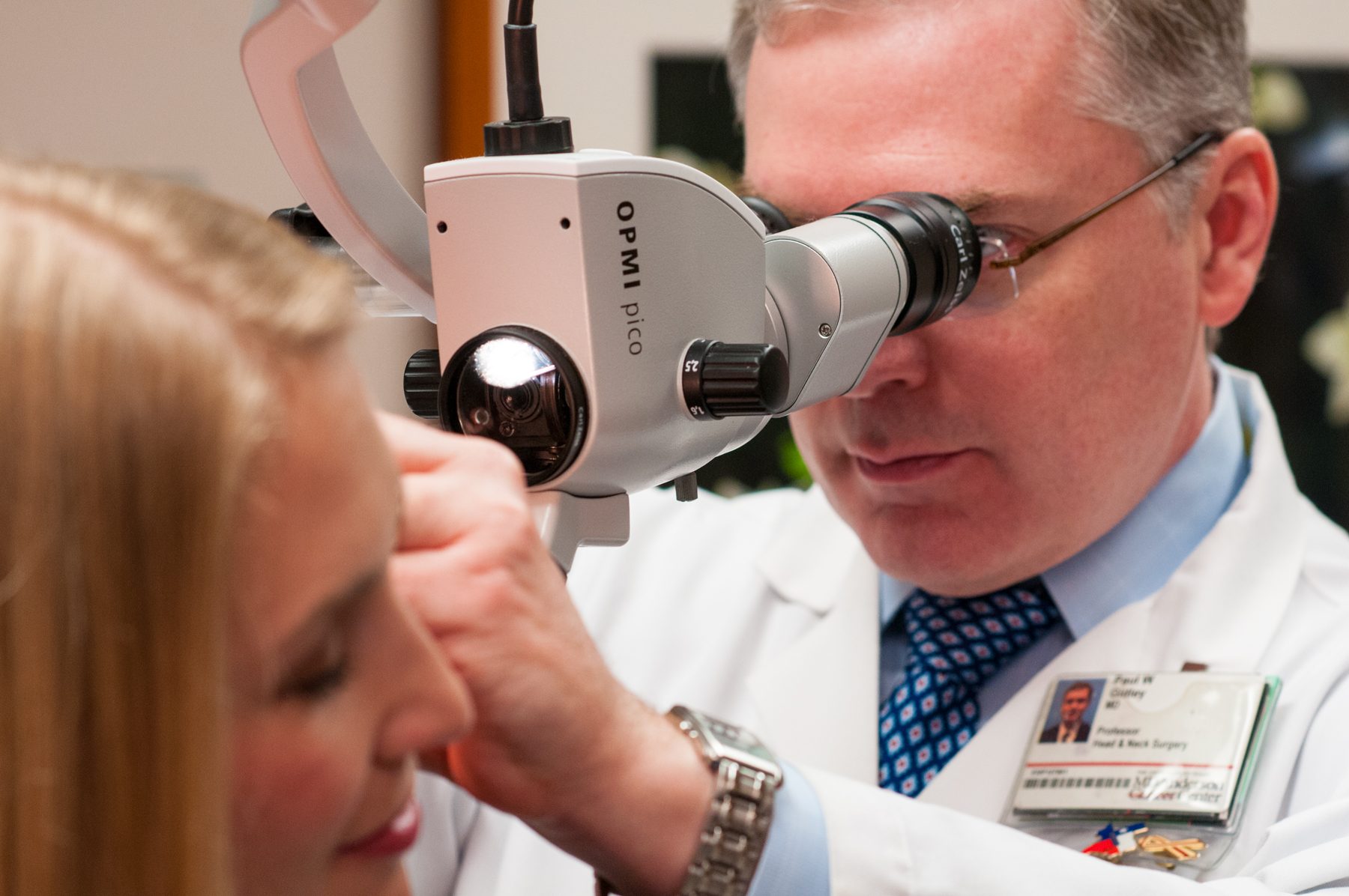request an appointment online.
- Diagnosis & Treatment
- Cancer Types
- Acoustic Neuroma
Learn more about our clinical trials.
View Clinical TrialsAcoustic neuroma, also known as a vestibular schwannoma, is a benign (non-cancerous) tumor. Despite the name, these tumors do not develop from the acoustic nerve. They start in the vestibular nerve, which is associated with balance.
Acoustic neuroma, also known as a vestibular schwannoma, is a benign (non-cancerous) tumor. Despite the name, these tumors do not develop from the acoustic nerve. They start in the vestibular nerve, which is associated with balance.
Acoustic neuromas are rare, benign tumors that grow on the nerve for hearing and balance, called the vestibulocochlear nerve or the eighth cranial nerve.
This nerve is made up of two separate nerves: the vestibular and the cochlear nerves. Acoustic neuromas grow on the vestibular nerve, which is responsible for balance.
About one person in every 100,000 in the United States is diagnosed with acoustic neuroma each year. While they can develop at almost any age, acoustic neuromas most commonly occur between age 40 and 50. Recent studies have shown an increase in acoustic neuroma diagnoses. This may be partly due to advances in MRI scanning.
Acoustic Neuroma Growth
The vestibulocochlear nerve and the facial nerve (also called the seventh cranial nerve) connect to the brainstem through a small canal, called the internal auditory canal (IAC). Frequently, small acoustic neuromas are located inside this small canal. As tumors grow, they expand into the space between the IAC and the brainstem.
The tumors usually grow slowly and do not spread through the body. The average tumor growth is estimated at one to two millimeters per year. However, some tumors grow more rapidly. Approximately one-third of patients have tumors that don’t seem to grow at all. A few tumors (1%-2%) get smaller without any intervention.
The factors that control acoustic neuroma growth are not understood at this time. Although acoustic neuroma is not cancer, tumors can be dangerous if they grow large and press against the brainstem or brain.
While there are no subtypes of acoustic neuroma, size plays an important role in treatment planning. Instead of requiring immediate treatment, small tumors, especially tumors confined to the IAC, can be monitored for growth with regular imaging exams. This is called active surveillance. Large tumors that compress the brainstem require surgical removal. In both cases, shared decision making between the patient and care team is the basis for determining the course of treatment.
Acoustic Neuroma Risk Factors
The cause of most cases of acoustic neuroma is not known. Most occur randomly, thus they are called sporadic vestibular schwannomas. These sporadic tumors are considered to be different from genetic tumors.
Neurofibromatosis type 2, a rare genetic disorder, produces symptoms (like hearing loss and tinnitus) in both ears due to acoustic neuromas on both sides. This is called bilateral acoustic neuroma. If you are concerned about this inherited family syndrome, we offer advanced genetic testing to let you know your risk.
Although there are theories that exposure to loud noise or cellular phone use may increase the likelihood of acoustic neuromas, none of these have been scientifically proven.
Learn more about acoustic neuroma:
Why choose MD Anderson for your acoustic neuroma treatment?
MD Anderson’s Head and Neck and Brain and Spine Centers offer customized treatment for patients with acoustic neuroma. Because they are uncommon and complex, acoustic neuromas demand attention from a highly experienced and skilled group of specialists.
The physicians and other professionals at MD Anderson have a remarkable level of experience and expertise in treating acoustic neuroma.
Comprehensive Treatment
Acoustic neuroma and its treatment can cause hearing loss. MD Anderson’s comprehensive Audiology Section helps evaluate and manage this issue. Rehabilitation services include conventional hearing aids, bone-anchored hearing aids (BAHA) or contralateral routing of sound hearing aids (CROS). Select patients may receive a cochlear implant.
Occasionally, patients develop additional challenges after treatment for acoustic neuroma, such as facial paralysis or loss of balance. Physicians in ophthalmology, plastic and reconstructive surgery, and rehabilitation medicine are available to help manage these issues.
In addition, many other experts may be part of your team, including:
- Oculoplastic surgeons for management of eye complications
- Physical therapists for balance problems
- Speech and swallowing experts
Personalized Treatment
Bilateral acoustic neuromas are a sign of a rare inherited disorder called neurofibromatosis type 2 (NF2). We offer complete genetic testing and counseling to help determine your risk. As one of the nation’s top research institutions, MD Anderson is investigating new ways to treat acoustic neuroma, especially for patients with NF2.
And, at MD Anderson you’re surrounded by the strength of one of the nation’s largest and most experienced comprehensive cancer centers, which has all the support and wellness services needed to treat the whole person – not just the disease.
I appreciated that Dr. DeMonte told it like it was, gave me my options and then shared his advice. I was never pressured one way or another, and the decision was mine.
Paula Johnson
Survivor
Treatment at MD Anderson

Clinical Trials
MD Anderson patients have access to clinical trials offering promising new treatments that cannot be
found anywhere else.
Becoming Our Patient
Get information on patient appointments, insurance and billing, and directions to and around MD Anderson.
myCancerConnection
Talk to someone who shares your cancer diagnosis and be matched with a survivor.
Prevention & Screening
Many cancers can be prevented with lifestyle changes and regular screening.
Counseling
MD Anderson has licensed social workers to help patients and their loved ones cope with cancer.
Help #EndCancer
Give Now
Donate Blood
Our patients depend on blood and platelet donations.
Shop MD Anderson
Show your support for our mission through branded merchandise.






